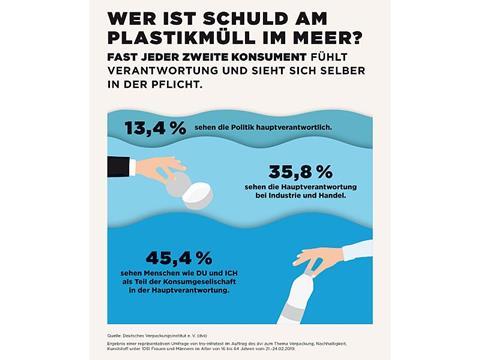
On the occasion of the 14th German packaging congress in Berlin, the German Packaging Institute (dvi) has surveyed consumers about their opinion about plastics, packaging and sustainability.
The tns-infratest survey yielded interesting results. Every other consumer (45.4 per cent) considers themselves responsible for ocean plastic waste as part of the consumer society. Product and packaging manufacturers and retailers are deemed to be almost equally responsible at 35.8 per cent.
When asked about suitable measures to avoid waste, consumers had a clear vision. For packaging, 40 per cent of consumers would like a stronger focus on important core tasks such as protection and safety (43.7 per cent). More than a third would like to see a boost for the development of alternative packaging materials (37.5 per cent). One in three Germans favour stricter legal guidelines for the use off recycling material or a ban of materials that harm the environment. (31.3 per cent). 24.9 percent would like to support companies who protect their products with reusable or deposit packaging.
dvi statement
dvi highlights that the results of this survey constitute a call to action for politics, business and industry.
“We all are in the same boat,“ says Kim Cheng, dvi’s managing director. “We can only win the fight against environmental destruction and for a more sustainable way of living together. We therefore welcome the survey’s well thought through and responsible point of views. But we also see a responsibility for ourselves. It is up to product manufacturers, the packaging industry and retail to enable the right solutions. In particular, we have to make life easy for people. Consumers want solutions, not tasks they have to fulfil. The survey also showed that there is not much willingness to stop consuming.”
When asked in which areas citizens would like to make a contribution in order to make their lifestyle more environmentally conscious and sustainable, the areas of food (36.9 per cent) and living (36 per cent) were in the lead. Only 19 per cent would find it easy to consume in a more sustainable way. The only thing considered even more challenging to make any changes in is the area of holidays (10.6 per cent).
dvi’s conclusion: The statements from the survey are a clear challenge for everybody involved, which they should accept,” Kim Cheng emphasises.
dvi has previously published a list of recommendations for retail, product and packaging manufacturers.
“Currently not a day goes by without a new initiative from the industry, ranging from the use of sustainable materials and recycling to the expansion of closed loop systems and consumer information, “says Kim Cheng. We see our recommendations confirmed and welcome the initiatives and far-reaching plans of our industry.”
dvi’s recommendations include:
- Packaging manufacturers must live up to their increased significance and responsibility. Facts should be objectively processed and made accessible to everyone. There is no alternative to facing up to responsibility, even on a global scale. Anyone operating on the world market must also inform about packaging in a responsible manner and in line with market requirements. In addition, the variety of packaging materials used should be limited, especially in the plastics sector, and the focus should be on easily recyclable mono material solutions. The industry’s innovative strength is high. This capability must be exploited to an even greater extent.
- Product manufacturers and brands should see packaging as part of the product. They should also provide transparent information about its packaging and assume responsibility to the same extent as providing information about the product. Packaging must provide honest and critical information about its purpose, its eco-balance, materials used and recycling capability, including clear instructions for action. The central point must be the design of the packaging in terms of suitability for the circular economy. Solutions that do not primarily concern the protection and safety of the packaged goods should be critically questioned.
- Retailers must make much greater use of their very direct access to consumers and play an informative role - combined with concrete solutions. The disadvantage of collecting used packaging close to households via the yellow sack is that waste is first thrown together and then has to laboriously be sorted again. In this context, retailers should themselves promote innovative recycling solutions and reusable packaging where they make ecological sense.
- Disposal companies should agree on uniform criteria and common labels for recyclability. For product manufacturers, brand owners and consumers, criteria and labels must be practicable, predictable and unambiguous.
















